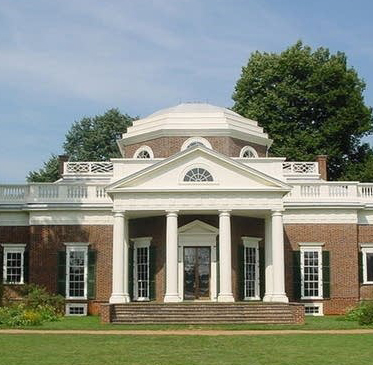

(Jefferson's home was built by slaves.)
When thinking about the founders of this country, people often forget to analyze all actions these individuals took. When it comes to Thomas Jefferson, there’s a dark past that many Americans are unaware of.
Jefferson is well known for drafting the Declaration of Independence, which proclaims that “all men are created equal.” Many say that he was an opponent of slavery. However, he owned more than 600 slaves, believed that African Americans were racially inferior to whites and advocated for the removal of black people from the U.S. to “emancipate” them. Jefferson believed that the solution to slavery was to further colonize and deport freed slaves back to Africa. He warned that the population of African Americans would reach levels where they would be unable to be deported if action was not taken immediately (see article written by The Atlantic below for direct passages).
Also see a direct racist quote from Jefferson here: “I advanced it, therefore, as a suspicion only, that the blacks, whether originally a distinct race, or made distinct by time or circumstances, are inferior to the whites in the endowments of both body and mind (Jefferson's Notes on the State of Virginia).”
Not only did Jefferson own slaves, but there are accusations that he raped one of his slaves, Sally Hemmings, multiple times, beginning when she was 14 years old. There is a high probability that Hemmings ended up having six of Jefferson’s children, which was concluded by DNA studies, primary and secondary documents, oral histories of both Jefferson and Hemmings, and from nationally renowned scholars (see more information in the articles linked below).
In addition to his disturbing behaviors regarding slavery, Jefferson also was one of the first leaders to propose policies that called for the removal of Native Americans from their homelands. Jefferson was a big advocate for western expansion, believing Native Americans must be removed from Western territories so the U.S. could take over the land and adopt national security. Jefferson believed the best way to expand the U.S. was to militarize borders and flood areas along the Mississippi River with large populations of white settlements.
In an 1803 private letter to William Henry Harrison, Jefferson wrote:
To promote this disposition to exchange lands, which they have to spare and we want, for necessaries, which we have to spare and they want, we shall push our trading uses, and be glad to see the good and influential individuals among them run in debt, because we observe that when these debts get beyond what the individuals can pay, they become willing to lop them off by a cession of lands.... In this way our settlements will gradually circumscribe and approach the Indians, and they will in time either incorporate with us as citizens of the United States, or remove beyond the Mississippi. The former is certainly the termination of their history most happy for themselves; but, in the whole course of this, it is essential to cultivate their love. As to their fear, we presume that our strength and their weakness is now so visible that they must see we have only to shut our hand to crush them, and that all our liberalities to them proceed from motives of pure humanity only. Should any tribe be foolhardy enough to take up the hatchet at any time, the seizing the whole country of that tribe, and driving them across the Mississippi, as the only condition of peace, would be an example to others, and a furtherance of our final consolidation. (Indian Affairs and the Administrative State in the Nineteenth Century, page 88)
Jefferson did not outright seize the land from the Native Americans, but established trading posts to drive Native Americans into debt, forcing them to give up their land to pay their bills. This allowed Jefferson to obtain about 33 treaties where Native Americans ceded 200,000 square miles of land in nine states (see Jefferson’s Indian removal policy below for more details).
JEFFERSON AND RACISM
Jefferson’s Attitudes Toward Slavery (Monticello)
Thomas Jefferson: Radical and Racist (The Atlantic, October 1996)
Thomas Jefferson’s Racism, 1788 (The American Yawp Reader, 1788)
JEFFERSON AND RAPE
Coard: President Thomas Jefferson: A Pedophile Rapist (Philly Trib, 3-3-18)
Thomas Jefferson is the R. Kelly of the American Enlightenment (The Washington Post, 2-15-19)
A rapist and slaver who did other things (Chicago Sun Times, 5-27-21)
JEFFERSON AND THE AMERICAN INDIANS
Thomas Jefferson: Architect of Indian Removal Policy (Indian Country Today, 1-19-16)
President Jefferson and the Indian Nations (Moticello)
Jefferson On Native Americans (Varsity Tours)